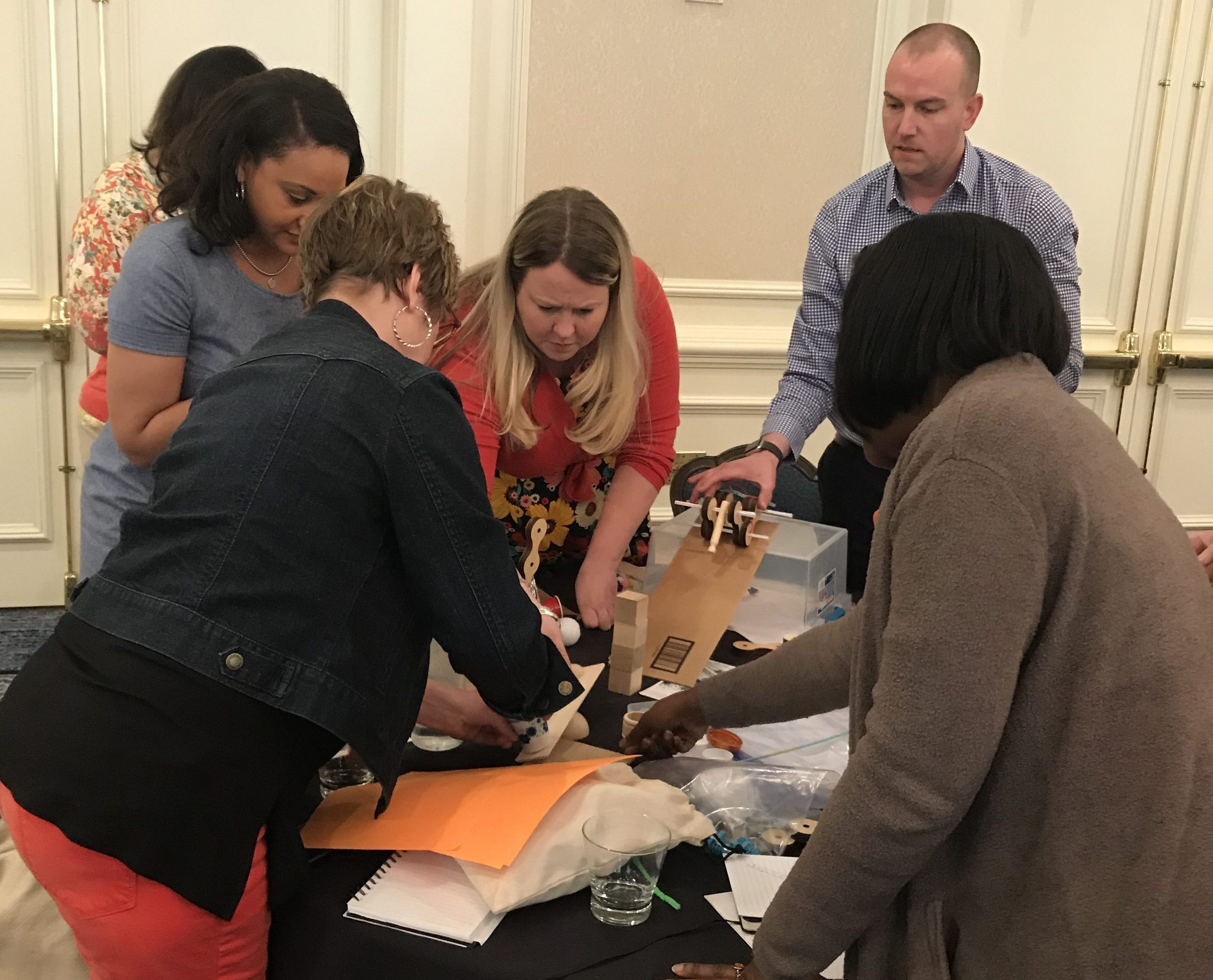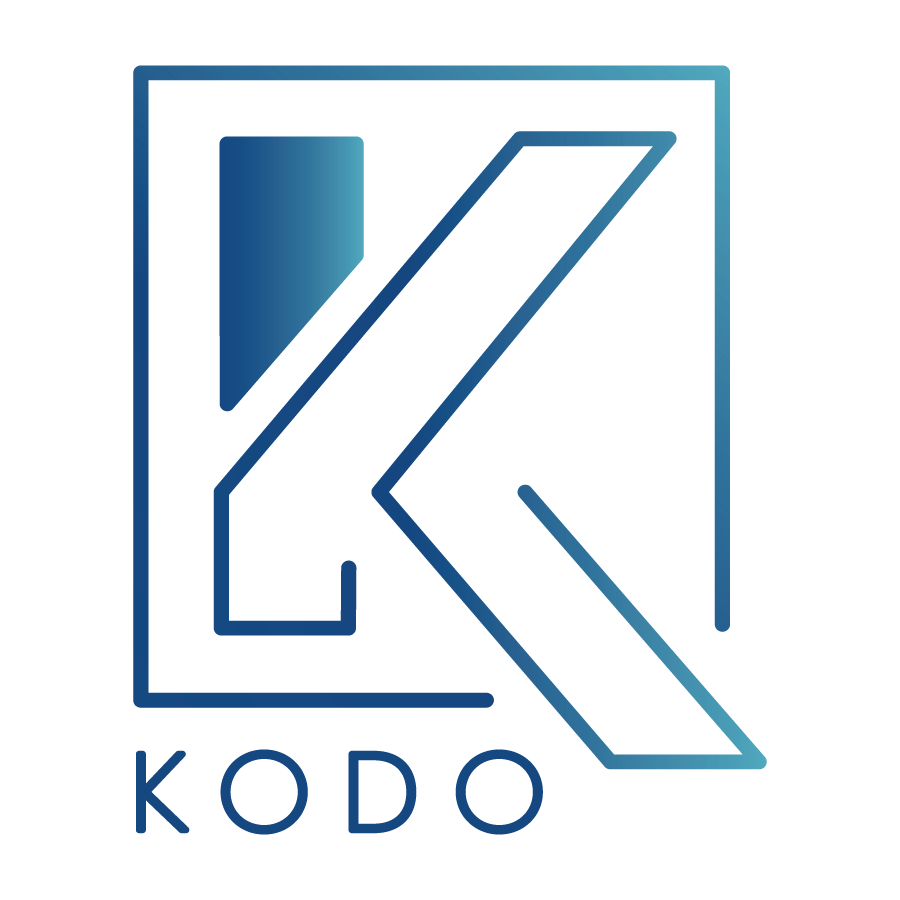In-Person

Kodo’s In-Person Professional Development services include sessions and materials that inform and transform an educator’s practice by:
- Translating theory into practice
- Providing hands-on interactive experiences for adult learners
- Using multimedia resources to observe and model successful practical strategies
- Offering opportunities for professional reflection
Pricing:
- Half day format for $1800*
- Full day format for $2500*
- Kodo Tour and Training (up to 2 hours) – $1500
- Keynote/Special Event: Call for pricing
*plus travel expenses
Available topics include:
Uncovering STEM Through Play
The core knowledge today’s students need is grounded in STEM subject matter. It includes literacy,
numeracy, scientific literacy, technology literacy, and cultural literacy. These subjects are typically
taught individually through direct instruction. Many higher education and industry leaders recognize
that young adults entering colleges, universities, and the workforce have a core knowledge base,
however, they lack the ability to “flex” their thinking. 21st-century learners approach complex
challenges and unknown situations fluidly, through critical thinking, problem solving, creativity,
communication, and collaboration. They apply curiosity, initiative, persistence, adaptability,
leadership, and social awareness to their changing learning and work environments.
Looking through the lens of 21st-century learning and the skills children need to succeed, we will
provide educators with an understanding of how STEM is naturally occurring in children’s everyday
play, exploration, and investigation of their world. We’ll look at how STEM domains overlap, how
children best experience STEM early on, and ways to foster a deeper level of thinking in children’s
play. Further, we will assist in the discovery of how educators can support and enhance children’s
cognitive, social, and emotional play through STEM investigations. Through hands-on experiences
with Kodo’s exclusive STEM based products and loose parts, a reflection of their learning through
play, and enhanced engagement from experienced trainers, participants will have the knowledge and
tools to uncover and incorporate STEM thinking and skills in the classroom environment.
OBJECTIVES: PARTICIPANTS WILL
1. Have an understanding of STEM domains and how they relate to 21st-Century learners and
skills.
2. Identify different types of materials and vocabulary that relate to STEM learning and
thinking.
3. Examine how STEM learning happens throughout the early childhood environment.
The 'E' In STEM: Demystifying Engineering
Engineering happens every day in early learning environments. In this session, we will demystify
engineering by clarifying what engineering is and identifying ways engineering is naturally
incorporated in the industry and play of children. We will examine how providing intriguing loose parts
and facilitating problem-solving using the design process are at the heart of engineering. We will
introduce Kodo’s TMI Design Process to engender problem-solving skills, support children’s growing
methods of communication, and introduce a framework for collaboration. Participants will learn how
to foster engineering mindset in children by focusing on process, in addition to outcomes when
facilitating their play and investigations. Come tinker with materials, experience engineering first
hand, and the importance of reflecting, expressing and representing both our own work and the work
of children.
OBJECTIVES: PARTICIPANTS WILL
1. Identify ways engineering is naturally occurring in children’s everyday work and play.
2. Examine how providing intriguing loose parts and facilitating problem solving using the
design process are at the heart of engineering.
3. Be introduced to Kodo’s TIMI Design Process to solve problems.
4. Learn how to foster an engineering mindset by focusing on process, making keen
observations, and documenting play and investigations.
Infant and Toddler Engineering
Engineering in early childhood environments is often avoided simply because we’re not very familiar with engineering. We will demystify engineering by clarifying what it is and identify ways engineering is already happening every day in infant toddler learning environments. We will examine how young children are natural engineers and how important it is to view and interact with them as competent and sophisticated thinkers at very early ages.
The goal of this session is for participants to learn specific strategies to broaden multisensory exploration through intriguing loose parts to foster young children’s brain development and pre-engineering behaviors; how to use the environment as third teacher to promote engineering thinking through a play based approach; and to understand and experience engineering for themselves through play, problem solving and collaboration with peers.
Practical strategies will be offered to broaden infant/toddler investigations. These strategies include favorite actions (such as ‘dump & fill’ and ‘sort & classify’), and through exploring diverse
attributes of materials and loose parts. In addition, we will present how to offer provocations through the environmental organization and presentation of materials.
OBJECTIVES: PARTICIPANTS WILL:
1. Recognize basic types of engineering that are common and happen every day in early
learning environments for infants and toddlers.
2. Clarify how the five senses are organizing principles for a child’s brain development and
the importance of providing intriguing loose parts that offer multisensory experiences to
foster early engineering behaviors in infants and toddlers.
3. Identify concrete strategies to foster and expand sensory exploration into meaningful
investigations.
4. Learn practical environmental and adult child facilitation strategies to foster engineering
thinking and behaviors in infants and toddlers.
Fostering Meaningful Investigations through Play and Provocation
Learn how intentional investigations support mature play and children’s natural proclivity to wonder, inquire, and explore. Understand the differences between activities, explorations, and investigations and how to encourage an investigation based learning approach. We will introduce six Provocation Styles and supporting strategies to authentically engage young children. We will present strategies to arrange a well organized environment and to adapt the learning environment to foster an investigation based learning approach. Participants will experience the importance of provocations by playing with intriguing materials and practice an integrated systematic approach to design meaningful investigations. Participants will have the opportunity to practice planning age-appropriate investigations using the six Provocation Styles.
OBJECTIVES: PARTICIPANTS WILL:
1. Examine and clarify the differences between activities, explorations and investigations.
2. Identify six Provocation Styles and supporting strategies to authentically engage young children.
3. Learn strategies to present a well organized environment and to adapt the learning environment to foster an investigation-based learning approach.
4. Experience the role of provocations while using open-ended loose parts to solve problems.
5. Practice planning age-appropriate ball investigations using the six Provocation Styles and Strategies.
Enhancing the Environment to Foster Engineering
The physical learning environment can greatly impact how children learn. Educators should be empowered to think of themselves as the designers of their own classrooms. Classroom design and intentional material selection are important tools in communicating your values and expectations of children. In this session, we will uncover how open-ended and diverse materials support children’s engineering play behaviors and problem-solving skills. Topics discussed include color theory, material selection, and space functionality. Participants will learn how to thoughtfully create a supportive and engaging learning environment that invites exploration and investigation.
OBJECTIVES: PARTICIPANTS WILL:
1. Understand the benefits of offering children open-ended materials.
2. Examine the impact of offering quality and diverse materials in every area of the classroom
3. Learn how to use key design principles to create a thoughtful and engaging classroom environment.
4. Reflect on what their own learning environment communicates to children.
NEW! Team Building Course! Tinkering, Playing, and Problem Solving to Build Relationships
The teachers within your program are integral to its success. When they work cooperatively and collaboratively, the benefits are far-reaching, affecting morale, interactions with children, communication with parents, and more. Teaching teams need to have open and professional communication with each other to ensure program objectives are met with care, efficiency, and effectiveness. In this session, participants will identify how their communication style and strengths lend to teamwork and cooperation. We will review the tools needed to promote professionalism and look closely at communication strategies to use daily. Additionally, play sessions with open-ended materials will be used to foster camaraderie, the team approach to problem-solving, and expose communication strategies. Care of the children and families in your program begins with the care of your teaching team.
OBJECTIVES: PARTICIPANTS WILL:
1. Recognize a variety of communication skills to use with teachers and parents.
2. Utilize the engineering design process as a lens to use when problem solving as a team.
3. Engage in meaningful provocations as a team to foster communication skills, team functioning, and interpersonal relationships.
4. Reflect on leadership styles and how to recognize the strengths of those on a team.
NEW! Math Course! Making Sense of Math!
“Young learners’ future understanding of mathematics requires an early foundation based on high-quality, challenging, and accessible mathematics education.” National Council of Teachers in Mathematics
It is becoming evident that mathematics is an important piece of STEM play and learning for the early childhood environment. With this, though, many educators feel intimidated with the topic of math and what facilitation of this looks like. In this session, educators will explore how mathematics assists children in making sense of their world and the various ways that educators can facilitate math through STEM exploration.
OBJECTIVES: PARTICIPANTS WILL:
1. Recognize the mathematical dimensions that children are exploring in the early childhood environment.
2. Understand that mathematics is more than rote counting, but rather, considering concepts, methods, and language to use to appropriately engage children in math experiences.
3. Engage in hands-on learning experiences to recognize how to facilitate mathematics through STEM exploration and investigation.

